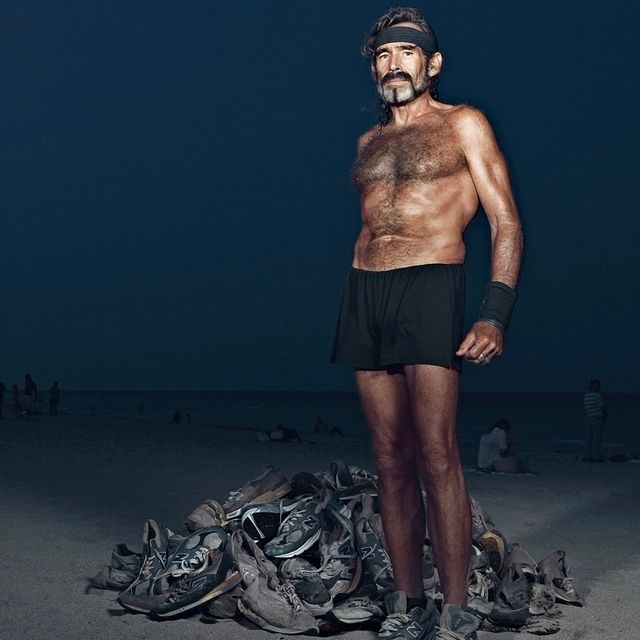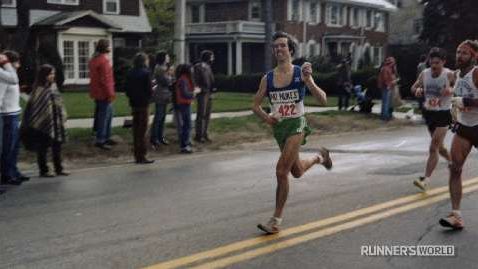Every evening visitors to Miami’s South Beach are treated to a sight as reliable as the sunset: A moving landmark, shirtless, clad in a black sweatband, black shorts, one black glove, and gray shoes, who can be seen completing his eight mile run along the shore. Born Robert Kraft, his friends and running tribe call him Raven.
At 5:30 p.m. he does a roll call. Sometimes Poutine is there, or Taxman. Deep Dish, Unsettled, or White Lightning may show up. But Raven is always there without fail.
On January 1, 1975, when Raven was 24 years old, he made a New Year’s Resolution to run eight miles every day. Now 66, he has run for more than 15,300 consecutive days and counting. He has run through seven hurricanes, despite food poisoning and the flu, and while suffering from man-o’-war stings, a concussion, and other misfortunes.
His tenacity and dedication have drawn attention among a group of runners who have been inspired to join him. Some only run once or twice, but others are regulars. To date, over 2,600 runners from 87 different countries have joined him. Raven Runners, as they affectionately call themselves, come from all walks of life and range from as young as six years old to over 80. Those who finish a run are given a nickname. Among his tribe is 34-year-old Laura Lee Huttenbach, known as White Lightning, who recently published a biography of Raven called Running with Raven.
“So many stories focused only on the eight miles a day, which is important and impressive in its own right,” says Huttenbach. “But I thought what was missing is what he’s given to thousands of individuals, and the community that he’s created.”
RW IN YOUR INBOX: Have the latest news, advice, and inspiration sent to you every day with our .
What makes Raven such a draw? Some runners join him to become healthier, or meet new people. Others feel that they are a part of something bigger. But behind it all, says Huttenbach, is that Raven makes people feel like they matter. There’s a sense of community, with Raven as the ultimate motivator.
“I say, ‘If I can do it every day, you can do it once in a while,’ ” says Raven. “And no matter where they are, wherever in the world they are, they know what time I’m out there.”
“You have to brush your teeth every day, and by running every day it’s kind of been my savior for all these years,” Raven says. “It’s just a part of me. It’s who I am.”
When people ask why he’s chosen eight miles as his distance, Raven tends to sound like Goldilocks, saying that seven is too short and nine is just too long. “I built up to eight miles and when I got to eight, I thought, I don’t want to do any more than that,” he says.
One thing Raven doesn’t do, however, is race. For him, it’s a philosophical issue. Raven believes that running should be free. He disapproves of paying race fees and is notorious for picketing the Miami Marathon.
That doesn’t mean Raven shuns runners who participate in races. He respects people who run for charity or run towards a certain goal, such as becoming healthier or obtaining a personal record. There comes a time, however, when a runner will no longer be able to run her personal best, and according to Raven, that’s when you start having fun.
RELATED: 4 Things We Can All Learn From Masters Runners
“Everybody gets to that point in life where you’re not going to be as fast as you were,” Raven says. “And if you learn that and try not to push it, you’ll have a good time.”
Without meaning to, Raven’s streak has become his mission to get people healthy and change their lives. Butcher, an ex-con convicted of drug trafficking, ran with Raven two hundred consecutive days. “I was in a really dark place,” he told Huttenbach, “and this run just sucks the negativity out of you. God only knows where I’d be without Raven and this run.” Butcher is now a personal trainer.
“Some people find the love of their life out there,” says Raven. He has officiated two Raven Runner weddings. “Sometimes there are people coming off a broken heart and get healed by running. You always feel better after you run. For me it was first mentally, and then physically was the bonus, and then spiritually after a while.”
Raven was raised in a household where, as he says, “kids were taught to be seen and not heard.” The only child of Walter and Mary Kraft, his parents divorced when he was four, and his mother eventually remarried a man Raven calls The Eagle, who abused him. One night, for instance, The Eagle, who was drinking bourbon and playing poker with his friends, asked Raven to turn his music down. When Raven ignored him, The Eagle punched Raven in the face and shut him in a closet.
Music was Raven’s escape from his home life. When he was 16, Raven dropped out of school to focus on his passion for songwriting. He tried his luck in Nashville but, in the words of Huttenbach, “the self-promotion in such a bustling industry town ate away at his soul.” He returned to South Beach and continued writing songs while working as a security guard. Now retired, he devotes his days to the streak and to his music.
“If you like songs about fugitives,” says Raven, “that was a specialty of mine for years. I used to avoid things, and that’s what the run was about: avoiding life and situations. I felt like I was a fugitive from life. Now I’m running towards things and not away from things like I used to. Now it’s like I’m running towards a good future.”
There is a small shadow of regret that Raven carries of never settling down. Maybe if he had stayed in Nashville, Raven says, he would have married and had kids. Raven’s longtime partner, Miracle, fills some parts of the emptiness that has followed him his entire life. However, he admits he sometimes wonders if he sacrificed the chance of raising a family for the sake of the streak.
At a book signing in May, Huttenbach made a video call to a Raven Runner nicknamed Sailboat, who was running with Raven. The New York City Raven Runners called out to Raven as he shuffled across the sand (Huttenbach says Raven’s pace has slowed down to 14 minutes per mile). Like a party trick, Huttenbach asked Raven what is the birth date of each of the runners in attendance. Raven knew every single date, including the year.
“This is Espionage, Raven,” a man seated near Huttenbach said. “How’re you feeling?” Raven nodded his head. “I’m making it, Espionage,” he said. “I’ve been worse!”
In her book, Huttenbach describes Raven’s body as a “five-foot-ten apostrophe” when he runs. But on this day, Raven’s running form had morphed into a tanned and weathered question mark, his back dramatically arched, his chin almost tucked into his chest. Decades of streaking have worsened Raven’s scoliosis, sciatica and spinal stenosis. Runners have rallied for Raven to go for surgery, but it would mean the end of his streak. For now, Raven goes to the doctor every month for pill refills to alleviate some of the pain.
RELATED: Ron Hill’s Record-Setting Running Streak Ends After 52 Years
“My back was really bad about two and a half years ago. I thought, I don’t know how much longer I could do this,” says Raven. “The more I’m thinking about surgery, the more horror stories I’m hearing, like Tiger Woods, Steve Heard and other athletes. They’re never the same. I’m just going to live with it as long as I can.”
Raven doesn’t drink or smoke. He tries to not do anything “too crazy,” especially during his strength workouts pre-run (60 pull-ups and 100 push-ups are a portion of Raven’s every day workout).
There’s this old joke, according to Huttenbach, that Raven’s end-of-streak fantasy is to run in a hurricane and have a lifeguard stand take him out mid-stride. But Raven has a more peaceful vision of how his streak will end.
“The ideal thing is I wouldn’t wake up and not ever know how far I couldn’t go,” he says. “I just wouldn’t wake up and that’d be the end of it. I wouldn’t have to worry about anything. But of course, God only makes those choices. I’d like to go for just as long as I live.”
For the timing being, Raven continues to run. Some Raven Runners reckon he is the one constant in this changing world. Does the runner ever feel he’s missed out by staying in the same place for the past 40 years? No, says Huttenbach. “By staying in one place,” she says, “the world has come to him.”
Above: Check out RW's profile on 50 year Boston streaker Ben Beach.
Amanda is a test editor at Runner’s World who has run the Boston Marathon every year since 2013; she's a former professional baker with a master’s in gastronomy and she carb-loads on snickerdoodles.













